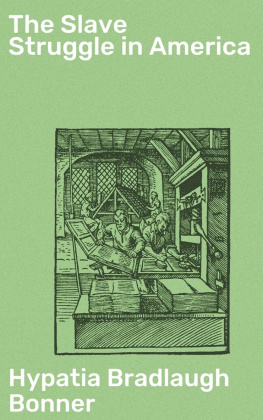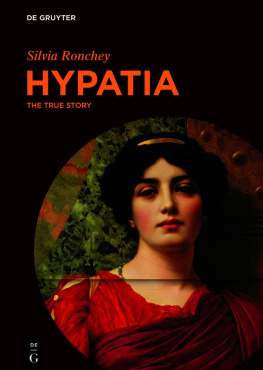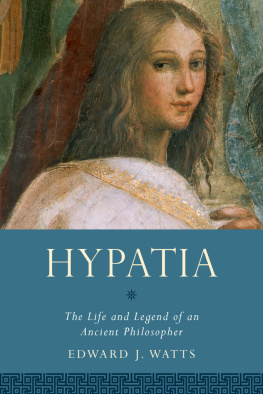
Copyright Information
Hypatia: Her Life and Times
Copyright 2012 Faith L. Justice
All rights reserved.
Raggedy Moon Books
https://RaggedyMoonBooks.com
Smashwords - Third Edition
Cover image licensed from iStockphoto
Cover design by Hannah J. Rothman
Print ISBN: 147915735X
Print ISBN-13: 978-1479157358
Epub ISBN: 978-1476318110
eBook License Notes
Thank you for downloading this eBook. All rights reserved. It remains the copyrighted property of the author, and may not be reproduced, copied or distributed for commercial or non-commercial purposes. Thank you for your support.
This book is also available in print. Order through any online or local bookstore.
Table of Contents
Acknowledgements
Sources used to write the essays in this book are listed at the end of each piece and in the Research Bibliography. To the extent you find errors, they are my own, not those of the other authors. Two books were of particular help and I review both in this volume: Hypatia of Alexandria by Maria Dzielska (Harvard University Press, 1995) and Hypatia of Alexandria: Mathematician and Martyr by Michael A. B. Deakin (Prometheus Books, 2007.)
Great love and thanks to my husband and daughter, who put up with my obsession with Hypatia over the years, cheered me on, made me coffee mugs and read my books.
Introduction
Firstthank you for purchasing this book and taking the time to read it. Secondthis is not a formal biography of Hypatia, the Lady Philosopher of Alexandria. Its a collection of essays and blog posts Ive written about Hypatia and her times over twenty years. I'm a historical novelist who tries my best to get it right. I first heard about Hypatia years ago and fell in love with her story. I chronicle my search for the "real" Hypatia in the first essay in this collection. I've been writing about her ever since: a novel, essays, book and movie reviews, and guest posts on others' blogs. This is a collection of all those pieces. Since these essays were written over time and for different audiences, there is some repetition of information.
When my novel (Selene of Alexandria, in which Hypatia is a major character) came out, I started to blog; mostly posts about my passionsLate Antiquity, Roman history, archaeologybut I also interviewed authors, reviewed and gave away books. Like most bloggers, I obsess over my views and track which articles are most popular. Hands down, anything about Hypatia draws the most readers and generates the most discussion. My posts on the historical accuracy of the movie Agora, starring Rachel Weisz as Hypatia, rank Nos. 1, 2 and 3. Hypatia has a devoted following in cyberspace.
As a favor to my readers and Hypatia fans, I decided to put all the material in one place. Most of these articles are free on the web, but scattered across various websites and blogs. I've expanded some of the essays and updated others with new information. I organized the material by relevance to Hypatia. Essays about her life, death and work are in the first part. Later, I branch out into "Her Times" with pieces on other lady philosophers, the city of Alexandria, the Great Library, and other famous women of her era. I finish with a section on writing Selene of Alexandria including an author interview and a sample chapter from my novel.
If you have questions or comments, feel free to get in touch with me through my website at https://faithljustice.com. I love to hear from folks. Enjoy and thanks again.
Faith L. Justice
Section I - Hypatia: Her Life
Section I

My Hunt for Hypatia, Lady Philosopher of Alexandria
The Legend
I first came across Hypatia's story in 1980 when I attended Judy Chicago's groundbreaking feminist art exhibit "The Dinner Party." Chicago and her team selected 39 subjects for an elaborate dinner party, where each "guest" (including several goddesses) was honored for her contributions to womankind with a specially designed plate and table runner. In the accompanying book, Hypatia is described as "a Roman scholar and philosopher who lived in Alexandria...she stressed the importance of goddesses and the feminine aspects of culture." The article details the pagan philosopher's death at the hands of a Christian mob.
I was hookedcaught up in the romanticism and inherent feminist drama of Hypatia's life. What I didn't realize was that many of the "facts" in this story were wrong. I embarked on a journey to learn as much as I could about this fascinating woman and found a bewildering array of fact and fiction. The primary historical record is sketchy, consisting of a mere sixteen pages; some of that written centuries later. No authenticated letters from, or writing by, Hypatia exist, although there are hints that she contributed to "commentaries" by her father Theon. Most of what we know comes from the surviving letters of one of her former students, Synesius of Cyrene and later Bishop of Ptolemais. Socrates Scholasticus' fifth century ecclesiastical history gives the most extensive account of her death.
These few fragmentary sources became the basis of a fantastic body of literature developed during the eighteenth century Enlightenment. Many authors and historians resurrected Hypatia's story and began the legend of the "beautiful young pagan scholar murdered by Christian monks in Alexandria." In 1720, John Toland, a zealous Protestant, wrote a historical essay with the unlikely title of Hypatia, or the History of a Most Beautiful, Most Virtuous, Most Learned and in Every Way Accomplished Lady; Who was Torn to Pieces by the Clergy of Alexandria, to Gratify the Pride, Emulation and Cruelty of the Archbishop, Commonly but Undeservedly Titled St. Cyril. Voltaire, Fielding, and Gibbon also came to the defense of the "young lady of greatest beauty and merit," primarily as a way of castigating the Catholic Church. The Church fought back by publishing The History of Hypatia, a Most Impudent School-Mistress: In Defense of Saint Cyril and the Alexandrian Clergy from the Aspersions of Mr. Toland.
The nineteenth century saw the emphasis shift to Hypatia's death as a symbol of the passing of an age. She inspired French poets, Italian writers, and English historians to rhapsodize over her beauty, intelligence, and pureness of spirit. In their minds Hypatia's death marked the end of a "golden age" of Greek civility, culture, and learning to which the authors longed to return. In 1853, the British author Charles Kingsley published a highly romanticized version of Hypatia's life in a novel titled Hypatia or the New Foes with an Old Face. When I blew the dust off the copy in my local library, I found he described Hypatia as having "the spirit of Plato and the body of Aphrodite." He claimed she died in her twenties and the Dark Ages immediately fell on Europe.
In the twentieth century, New Age pagans, scientists and feminists laid claim to Hypatia's story. Scientists claimed her as a martyra mathematician and astronomer killed by ignorant bigots. Carl Sagan introduced her to a new generation in his TV series Cosmos. Feminists saw her murder as a misogynist actHypatia, who advised governors and taught future bishops, was silenced because she was a woman. Sorting through the hyperbole of Protestants, Catholic apologists, and modern hero worshipers, I had more questions than answers. Who was this woman who inspired poets, artists, and writers across the ages?













